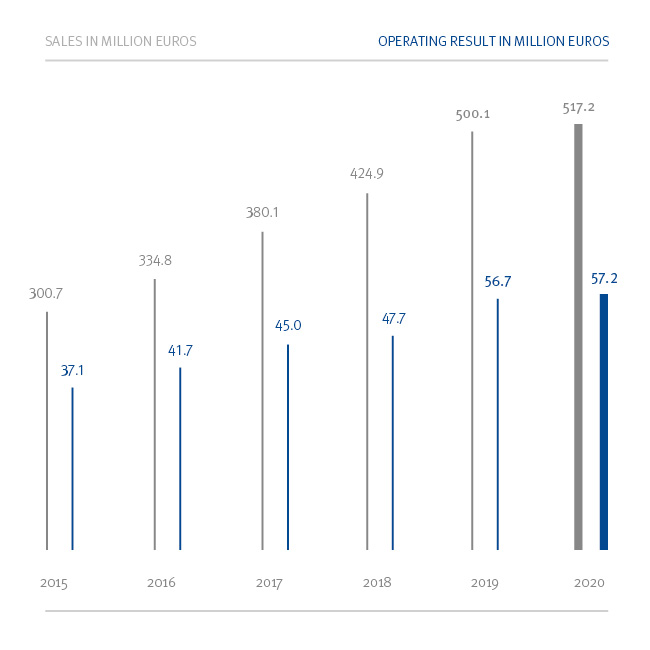Stuttgart, June 29, 2021. While the impact of the pandemic has brought many sectors and companies to their knees, Drees & Sommer SE is faring comparatively well. The international planning and consulting company headquartered in Stuttgart increased its sales in 2020 by 3.4 percent year on year to EUR 517.2 million, while the operating result of EUR 57.2 million was slightly above the previous year’s level of EUR 56.7 million. The partner-managed company sees its resilience as a key factor in defying the crisis. This approach includes a future-oriented strategy with a focus on sustainable and digital methods, the high degree of flexibility on the part of employees, and the importance placed on environmental and social responsibility.
‘Buildings and urban districts are regarded as resilient if they can withstand the impact of climate change, digital transformation and economic shocks such as the coronavirus pandemic. We pursue this objective in the construction projects that we supervise. This requires us to be flexible and adapt quickly to changes in use, while ensuring economic and energy-efficient operation. When the needs and priorities of our clients changed (in some cases overnight) during the Covid-19 crisis, our employees responded rapidly and with exceptional dedication to deliver an innovative scope of services. We have succeeded in making mobile working easily possible throughout the company, while still keeping our projects going on site, with all safety precautions in place,’ explained Steffen Szeidl, Spokesperson of the Drees & Sommer SE Executive Board.
The firm reports that orders from the Property Companies, Life Sciences and ICT sectors and from the international locations have made a notable contribution to the stable consolidated net income.
Dierk Mutschler, Member of the Executive Board, added: ‘With our clients in mind, we are thinking beyond the building itself and developing an understanding of their core processes and the issues that bother them. At the moment, for example, we are focusing increasingly on energy efficiency, renewable energy and hydrogen, as well as sustainable mobility solutions.’
Trying Out Pioneering Technologies in Own Projects
An example of why pioneering technologies related to sustainability and digital services and processes are worthwhile in the construction industry is provided by Drees & Sommer through constructing the new office building in Obere Waldplätze 12 (OWP12) for its own use in Stuttgart. As a plus-energy building, it is designed to generate more energy than it consumes when in operation. Well-known cooperation partners are supporting the construction project. OWP12 was the first project to use the unitized façade developed jointly with the FKN Group. The space-saving and recyclable building shell reduces the energy consumed to a minimum, generates energy itself, while meeting the most stringent sound insulation requirements. Together with Würth, Drees & Sommer also designed an innovative module for technical building equipment, offering considerable time and cost benefits in the design, production and assembly phases.
Extending our Lead with Strong Partnerships
The planning and consulting company extended its lead as a pioneer of digital processes and services in the construction and real estate sector in 2020 through equity investments. In conjunction with the proptech Architrave, based in Berlin, it intends to develop a digital platform for the entire industry. With Digitales Bauen GmbH, a modularization specialist based in the German city of Karlsruhe, Drees & Sommer aims to modularize even the most challenging of architectural designs in the future – with the aim of reducing complexity. The stake taken in Dutch consulting and project management firm BOAG added considerably to the firm’s international presence in the Netherlands and in a range of sectors.
50th Anniversary: Employees Implement 50 Ecological and Social Projects
Instead of celebrating the company’s 50th anniversary in 2020 at great expense, Drees & Sommer employees carried out 50 ecological and social projects over the course of the year. The company also reduced and compensated for CO2 emissions to such an extent that it has been climate positive since last year and is on the right path for decarbonization. ‘These are all steps on the road to becoming what we call a beneficial company: one which acts as a role model and gives back, not only to the environment but also to society, more than it consumes,’ commented Dierk Mutschler.
Outlook: Well Positioned for Imminent Transformation
The European Commission’s Green Deal has sparked a mood of enthusiasm for making all sectors – and thus the entire continent – climate-neutral by 2050. Going forward, strict environmental, social and governance (ESG) criteria will ensure sustainable real estate investments. In addition, the New European Bauhaus cultural initiative will increase acceptance across society. ‘The basic idea behind Bauhaus is just as relevant today as it was 150 years ago. It’s about breaking with the old and accustomed ways, to work towards a livable future. With our sustainable range of digital services and our external partnerships, we are very well positioned to meet the requirements of our clients,’ said Executive Board Spokesperson Steffen Szeidl.
